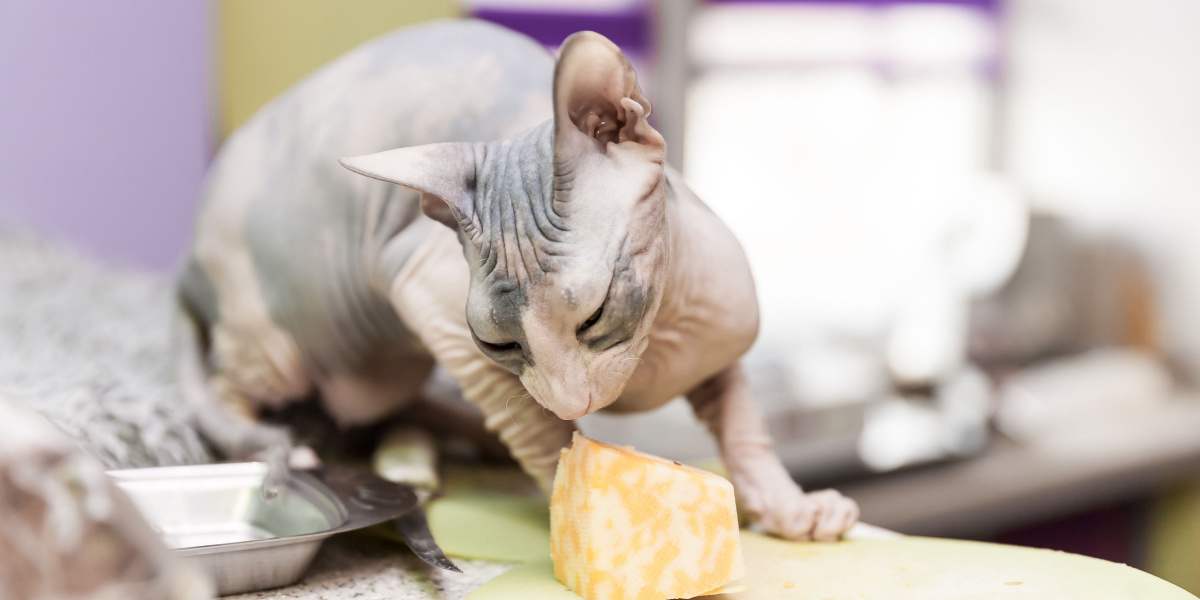
Have You Ever Wondered if Cats Can Eat Cheese?
Maybe your cat swiped a taste of your grilled cheddar cheese sandwich, or perhaps you’ve just used a bit of cream cheese to get your cat to swallow a pill. Before feeding your cat any new human foods, it’s always smart to do a bit of research to make sure it’s safe.
Cats can safely eat many of the foods people do, and some are even healthy to feed cats in moderation. But some “people foods” are not good to feed cats, either because they cause digestive upset (like diarrhea or vomiting) or because they are actually toxic to cats.
Although cats can safely enjoy small amounts of many human foods as healthy treats, cheese is unfortunately not a good choice for your furry friend.Quick Overview: Can Cats Eat Cheese?





Summary of Content
Is It Safe To Feed Cheese for Cats
Unfortunately, there aren’t many benefits of feeding cheese to cats. Although cheese of all kinds (whether cheddar, Swiss, mozzarella, or Parmesan) can be a healthy source of protein for humans, cheese is not well suited to a cat’s nutritional needs.
Because cats are obligate carnivores (which means that the majority of their diet should be comprised of meat), they benefit most from foods that are high in protein, but low in fat and carbohydrates.
This is especially true of domestic house cats, which tend to have lower overall calorie needs, so they shouldn’t eat foods high in fat. Cheese does contain a high protein content, but it also contains a lot of fat.
Incorporation of Cheese in Commercial Cat Food Formulations
Cheese is used in some commercial cat foods, though it’s not a common ingredient. Brands like Purina Fancy Feast and Applaws incorporate cheese into their formulations to enhance flavor and provide additional nutrients.
Cheese can appear in various forms in pet food, including cheddar cheese, cottage cheese, and cheese cultures. While cheese can be a flavorful addition to cat food, it’s important to note that many cats are lactose intolerant. Therefore, cheese is typically used in small amounts to avoid digestive issues.
Is Cheese Bad for Cats?
Although decades ago it was thought that one of the best snacks for a cat was a bowl of milk, we now know that cats do not digest dairy well. In fact, lactose intolerance is something that’s very common in cats.
Cats that are lactose intolerant don’t digest the sugar lactose found in milk and other dairy products like yogurt and cheese. If a cat eats milk it can result in a very upset tummy, with diarrhea and sometimes vomiting.
Some cats can actually tolerate milk OK, but it’s still not good to feed a lot of milk from a nutrition standpoint.
Although cheese typically has less lactose than cow’s milk ( hard cheeses have less lactose than soft cheeses), cheese still has the potential to upset a cat’s stomach. When you couple cheese’s lactose content with the fact that it’s high in fat and calories, it all adds up to a poor snack choice for cats.
How to Safely Feed Your Cat Cheese?
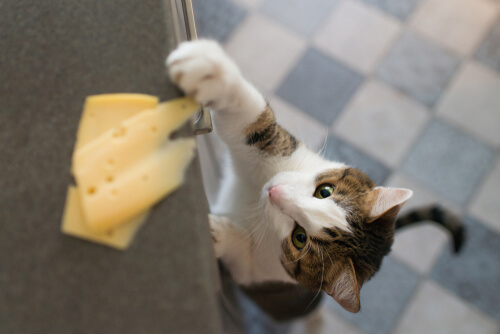
Cat owners should not choose to feed cheese to cats on a regular basis because it’s not healthy for cats, but cheese itself is not toxic or poisonous to cats.
In fact, some commercial cat treats are cheese flavored, although they have been made specifically for cats.
Although you should try to keep cheese away from your cat, if your cat sneaks a small piece of cheese from your sandwich or licks a bit of cottage cheese from your bowl, do not worry—it’s not likely to cause too many issues.
Do your best to keep cheese out of your cat’s diet. In addition to the tummy upset that cheese might cause, the excessive calories and high fat content of cheese can contribute to obesity, which is a serious problem in cats.
Also Read: Can Cats Eat Eggs?
If your cat eats a large amount of cheese, keep a close eye on her to watch for digestive issues in the form of diarrhea or possibly vomiting. If your cat seems to be very ill after eating a large amount of cheese, contact your veterinarian to ask if she should be examined.
There is one instance when feeding your cat a smidgen of cheese should be OK. It’s notoriously hard to pill a cat.
If your cat temporarily needs to take medication, and your cat really likes cheese, it’s fine to wrap the pill in a tiny bit of cheese (good types of cheese to do this include cream cheese or some other soft cheese) so she will take the medication easily. Just be sure not to overdo it and if your cat seems to suffer any ill effects from the cheese, try something else like a tiny bit of low-sodium deli meat.
Cheese for Cats: Not a Good Idea
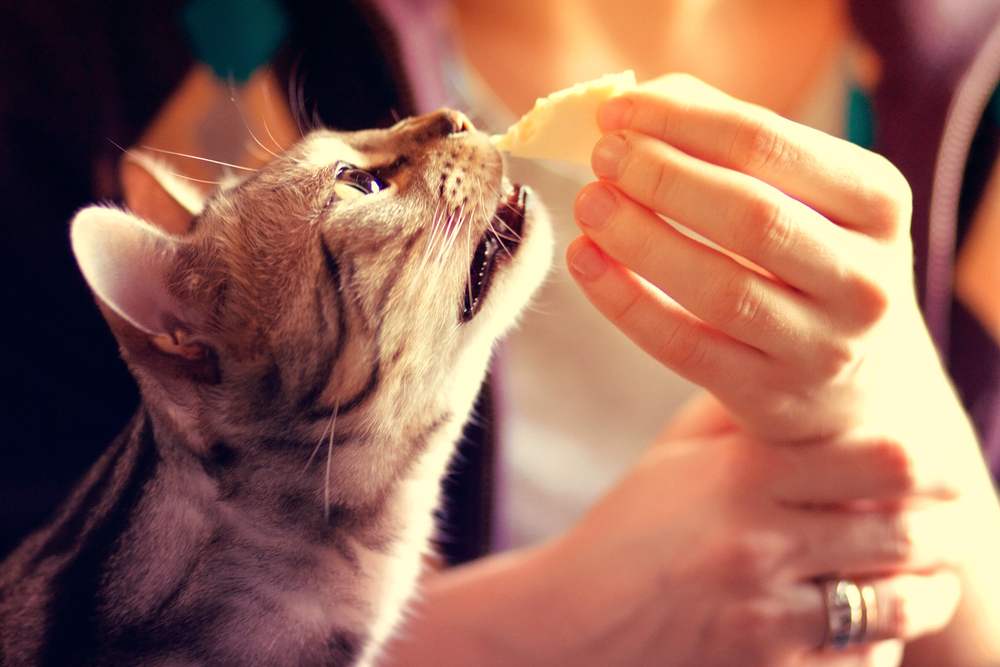
Although cats can safely enjoy small amounts of many human foods as healthy treats, cheese is unfortunately not a good choice for your furry friend. Some better treat options for cats include commercial cat treats, tiny bits of canned tuna, scrambled or hardboiled egg, or plain cooked chicken.
Always double check with your veterinarian before giving your cat any new foods and make sure not to overdo it with treats, which should make up no more than 10% of your cat’s total food intake for the day, with the remainder coming from her complete and balanced cat food.
Frequently Asked Questions About Cheese for Cats
What happens if cats eat cheese?
Cheese can upset a cat's digestive system, including diarrhea and possibly vomiting. Cheese is also high in fat and calories, and can contribute to unwanted weight gain in cats.
How much cheese can cats eat?
Cats shouldn’t eat cheese. Tiny amounts of cheese, such as what you would use to hide a pill, are probably OK, but cheese is not a healthy treat choice for cats.
Can cheese kill cats?
Cheese is not toxic to cats. If a cat eats cheese, it’s unlikely to die from it. However, feeding cheese to cats should be avoided whenever possible because it's not a healthy food for cats.





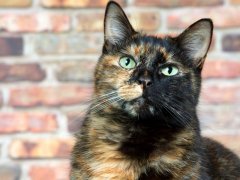
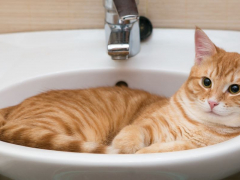

Thanks Daphne – interesting information but not quite sure why you are posting to this particular blog post, which I did not write! Thanks Pete
Hi Pete Wedderburn
I am regular reader of your blog. My jack is 2 years old now and I am following your blog for him. I also want to share some information about importance of low protein cat food and how to cure kidney disorders in cats.
Low protein cat food is also a time tested cure to kidney stones and other kidney disorders in cats. This is because if the diet is low in protein, filtering out all the harmful substances will not be too hard, reducing the pressure on the kidney and thus avoiding kidney failure and other diseases. Veterinarians would recommend low protein cat food to every animal patient suffering from kidney diseases.